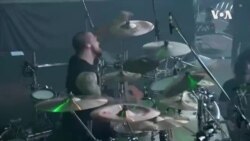ແອັບເພງໃໝ່ຍອດນິຍົມໄດ້ໃຊ້ປັນຍາປະດິດ ຫລື AI ເພື່ອເຮັດໃຫ້ “ກາຍເປັນເລື້ອງປະຊາທິປະ ໄຕ” ກ່ຽວກັບວ່ານັກດົນຕີທີ່ມີຄວາມຄ່ອງແຄ້ວໃນທຸກລະດັບສາມາດຮຽນຮູ້ ແລະຫຼິ້ນດົນຕີໄດ້ຄືແນວໃດ. ຈູລີ ທາໂບ ນັກຂ່າວວີໂອເອມີລາຍລະອຽດເພີ່ມເຕີມ ຊຶ່ງ ບົວສະຫວັນ ຈະນຳມາສະເໜີທ່ານໃນອັນດັບຕໍ່ໄປ.
ອີລອຍ ຄາຊາກຣານຈີ (Eloy Casagrande) ເລີ້ມຕີກອງຕັ້ງແຕ່ຕອນລາວອາຍຸໄດ້ 7 ປີ, ເຊິ່ງເປັນຄວາມມັກທີ່ລາວພັດທະ ນາໃຫ້ກາຍເປັນອາຊີບທີ່ປະສົບຜົນສໍາເລັດໄດ້.
ເມື່ອບໍ່ດົນມານີ້ ລາວໄດ້ຄົ້ນພົບແອັບດົນຕີທີ່ອະນຸຍາດໃຫ້ຜູ້ໃຊ້ສາມາດເອົາອົງ ປະກອບໃດກໍໄດ້ຂອງເພງທີ່ມີການປະສານສຽງຢ່າງສົມບູນແລ້ວ, ລວມທັງ ສຽງຮ້ອງ ແລະເຄື່ອງດົນຕີຂອງແຕ່ລະຄົນນັ້ນ ອອກຈາກເພງໄດ້.
ອີລອຍ ຄາຊາກຣານຈີ, ຜູ້ໃຊ້ແອັບມອຍສິຊ (Moises) ກ່າວຜ່ານທາງ Skype ວ່າ:
“ຕັ້ງແຕ່ຂ້ອຍຍັງເປັນເດັກນ້ອຍ, ແລະຂ້ອຍຢາກຈະຫຼິ້ນເພງທີ່ອັດມາແລ້ວ ເພື່ອຮຽນຮູ້ເພງໃນດ້ານສຽງກອງ, ຂ້ອຍໄດ້ບັນທຶກສຽງນອກເໜືອຈາກສຽງກອງຕົ້ນສະບັບນັ້ນອີກ.”
ອີລອຍ ຄາຊາກຣານຈີ ກ່າວຢູ່ໃນ YouTube ວ່າ:
“ດຽວນີ້ຂ້ອຍສາມາດເລືອກເພງໃດກໍ່ໄດ້, ເພື່ອເອົາສຽງກອງອອກ. ຂ້ອຍ ສາມາດສ້າງສຽງກອງຂອງຂ້ອຍເອງຂຶ້ນມາໄດ້.”
ເປົ້າໝາຍຂອງແອັບນີກໍແມ່ນເພື່ອໃຫ້ນັກສິລະປິນທີ່ມີຄວາມຄ່ອງແຄ້ວໃນທຸກ ລະດັບສາມາດເຂົ້າເຖິງເທັກໂນໂລຈີສຽງທີ່ທັນສະໄໝໄດ້, ອີງຕາມຄຳເວົ້າຜູ້ສ້າງຂອງມັນຂຶ້ນມາ.
ທ່ານ ເຈີຣອລໂດ ຣາມັອສ (Geraldo Ramos), ຜູ້ຮ່ວມກໍ່ຕັ້ງບໍລິສັດ Moises, ກ່າວຜ່ານທາງ Skype ວ່າ:
"ດັ່ງນັ້ນປັນຍາປະດິດໄດ້ເຂົ້າມາ, ແລະໂດຍທີ່ມີເທັກໂນໂລຈີທີ່ເອີ້ນວ່າ ການຮຽນຮູ້ຂອງເຄື່ອງຈັກ, ພວກເຮົາສາມາດຝຶກອົບຮົມສູດຄິດໄລ່ໃນຄອມພິວເຕີ ໃຫ້ຮູ້ແຍກສຽງເຄື່ອງດົນຕີພວກນັ້ນພາຍຫຼັງທີ່ມັນເອົາມາປະສົມໃສ່ກັນແລ້ວ."
ທ່ານ ຣາມັອສ ເວົ້າວ່າ ເທັກໂນໂລຈີປະເພດນີ້ໄດ້ມີໃຫ້ໃຊ້ໃນການຜະລິດດົນຕີ ມາໄດ້ໄລຍະນຶ່ງແລ້ວ, ມີແຕ່ວ່າພວກນັກດົນຕີທີ່ຫລິ້ນປະຈຳວັນບໍ່ສາມາດເຂົ້າເຖິງມັນໄດ້ເທົ່ານັ້ນ.
ທ່ານຣາມັອສ ກ່າວວ່າຜ່ານທາງ Skype ອີກວ່າ:
"ສະນັ້ນລອງວາດພາບເບິ່ງ ຄ້າຍກັບວ່າພວກເຮົາເປັນເຄື່ອງຄາຣະໂອເກະ (karaoke) ທົ່ວໄປທີ່ທຸກຄົນສາມາດອັບໂຫລດເພງໄດ້, ແລະຫຼັງຈາກນັ້ນ ກໍປັບເພງໄດ້ຕາມໃຈຊອບຂອງເຂົາເຈົ້າ."
ຜູ້ຊ່ຽວຊານດ້ານກົດຫມາຍຊີ້ໃຫ້ເຫັນວ່າ ທຸກຄັ້ງທີ່ມີເທັກໂນໂລຈີໃຫມ່ ທີ່ໃຊ້ກັບດົນຕີ, ອາດຈະມີຄວາມເປັນຫ່ວງໃນເລື້ອງລິຂະສິດ.
ທ່ານ ພອລ ຟາກເລີ (Paul Fakler) ເປັນຄູ່ຮ່ວມທຸລະກິດ ຂອງບໍລິສັດກົດຫມາຍ ເມເຢີ ບຣາວ (Mayer Brown) ໃນນິວຢອກ ທີ່ລົງເລິກດ້ານກົດຫມາຍລິຂະສິດ. ທ່ານໄດ້ໂອ້ລົມກັບວີໂອເອ ຜ່ານທາງ Skype ວ່າ:
“ສະນັ້ນ ເປັນທີ່ຈະແຈ້ງແລ້ວວ່າ ມັນເປັນແອັບທີ່ເປັນປະໂຫຍດຫຼາຍ ເຊັ່ນວ່າ ສໍາລັບການຮຽນດົນຕີຢູ່ໃນຫ້ອງນອນຂອງທ່ານເອງ. ແຕ່ໃນທາງກົງກັນຂ້າມ, ຖ້າຜູ້ໃຊ້ ຈາກນັ້ນແລ້ວກໍຫັນມາ ແລະຈຳໜ່າຍເພງທີ່ອັດໄວ້ ຊຶ່ງເຂົາເຈົ້າເຮັດ ໂດຍໄດ້ໃຊ້ເພງຂອງຄົນອື່ນ, ນັ້ນຫລະແມ່ນເວລາ ທີ່ເຈົ້າເຂົ້າໄປໃນພື້ນທີ່ ສີຂີ້ເຖົ່າທີ່ມີບັນຫາ.”
ທ່ານ ຣາມັອສ ເວົ້າວ່າຜູ້ໃຊ້ແອັບນີ້ ຄວນເອົາໃຈໃສ່ຢ່າງໃກ້ຊິດຕໍ່ຂໍ້ກຳນົດໃນເງື່ອນໄຂການນໍາໃຊ້ທີ່ໄດ້ຂຽນລົງໃນເວັບໄຊຂອງແອັບນັ້ນ.
ນັບຕັ້ງແຕ່ໄດ້ເປີດຕົວໃນປີ 2019 ເປັນຕົ້ນມາ ບໍລິສັດໄດ້ເຕີບໂຕຫຼາຍຂຶ້ນ ໂດຍມີຜູ້ຊົມໃຊ້ຫລາຍກວ່າ 6 ລ້ານຄົນໃນທົ່ວໂລກ ຊຶ່ງເຮັດໃຫ້ມັນກາຍເປັນ ນຶ່ງໃນແອັບດົນຕີທີ່ນິຍົມໃຊ້ຫລາຍທີ່ສຸດໃນລະບົບຂອງ iOS ແລະ Android, ອີງຕາມຕົວເລກຂອງການຈັດອັນດັບຈາກຮ້ານ Apple App Store ແລະ Google Play.
ອ່ານຂ່າວນີ້ເປັນພາສາອັງກິດຢູ່ລຸ່ມນີ້:
A popular new music app uses artificial intelligence to “democratize” how musicians of all skill levels learn and play music. VOA’s Julie Taboh has more.
Eloy Casagrande ((Casa-GRAN-gee)) has been playing the drums since he was seven years old, a passion he’s developed into a successful career.
He recently discovered a music app that allows users to remove any element of a fully mixed song, including vocals and individual instruments.
Eloy Casagrande, Moises App User, Skype:
“Since I was a kid, and I wanted to play a cover to learn a song on the drums, I had to record on top of the original drummer.
Eloy Casagrande and YouTube:
Now I'm able to choose any song, to remove the drums. I can create my own drums.”
The goal of the app is to give artists of all skill levels access to cutting-edge audio technologies, says its creator.
Eloy Casagrande ແລະ YouTube:
Geraldo Ramos, Moises Co-founder, Skype:
“So artificial intelligence comes in, and with a technology called machine learning, we're able to train an algorithm to separate that instrument after it's mixed out.”
The technology has been available for music production for a while, says Ramos, but was simply inaccessible to the everyday musician.
((Geraldo Ramos, Moises Co-founder)) ((Skype))
“So imagine like we are a universal karaoke machine where anyone can upload a song, and then adjust the song the way they want to.”
Legal experts point out that whenever there’s a new technology that works with music, there could be copyright concerns.
Paul Fakler ((FAHK-ler)) is a partner at the New York law firm of Mayer Brown, with a focus on copyright law. He spoke with VOA via Skype:
“So it's clearly a very useful app, like for learning music in your bedroom. On the other hand, if users then turn around and distribute recordings that they make using other people's music, that's when you get into the more troubling gray area.”
Ramos says users of the app should pay close attention to the terms of use posted on the app’s website.
Since its launch in 2019, the company has grown to more than 6 million users worldwide.
Making it one of the most popular music apps on iOS and Android platforms, according to ranking numbers from Apple App Store and Google Play.





